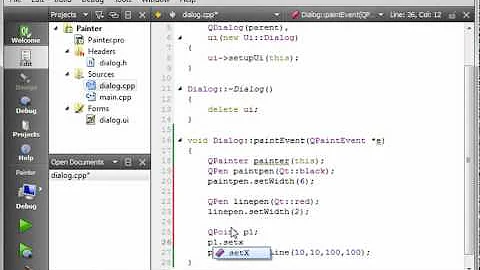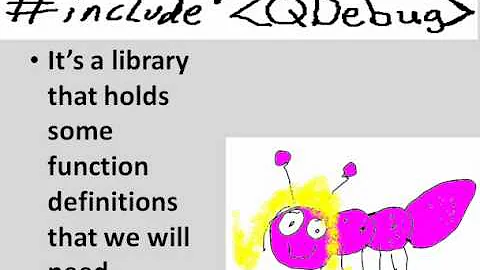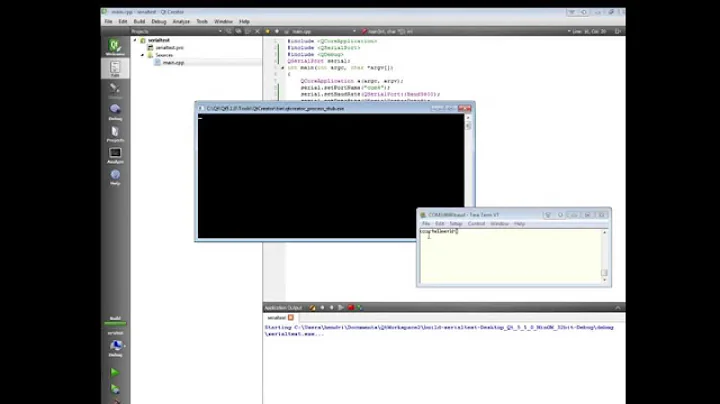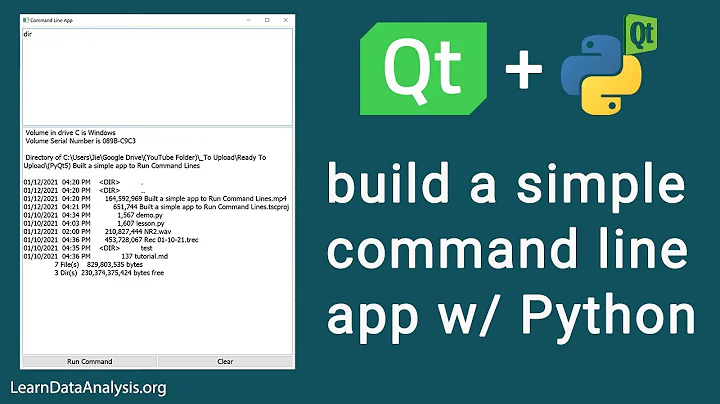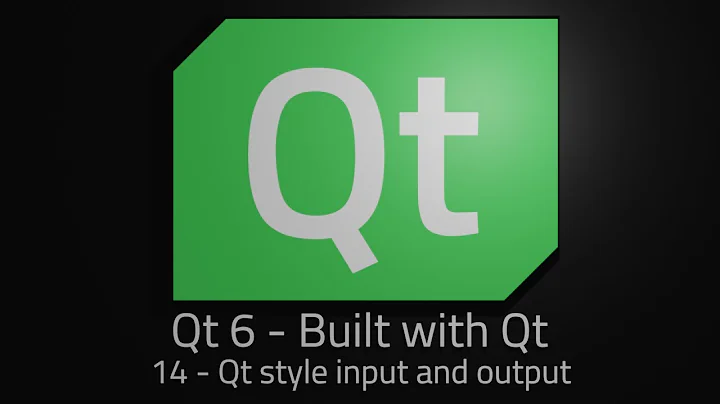How to print to console when using Qt
Solution 1
If it is good enough to print to stderr, you can use the following streams originally intended for debugging:
#include<QDebug>
//qInfo is qt5.5+ only.
qInfo() << "C++ Style Info Message";
qInfo( "C Style Info Message" );
qDebug() << "C++ Style Debug Message";
qDebug( "C Style Debug Message" );
qWarning() << "C++ Style Warning Message";
qWarning( "C Style Warning Message" );
qCritical() << "C++ Style Critical Error Message";
qCritical( "C Style Critical Error Message" );
// qFatal does not have a C++ style method.
qFatal( "C Style Fatal Error Message" );
Though as pointed out in the comments, bear in mind qDebug messages are removed if QT_NO_DEBUG_OUTPUT is defined
If you need stdout you could try something like this (as Kyle Strand has pointed out):
QTextStream& qStdOut()
{
static QTextStream ts( stdout );
return ts;
}
You could then call as follows:
qStdOut() << "std out!";
Solution 2
I found this most useful:
#include <QTextStream>
QTextStream out(stdout);
foreach(QString x, strings)
out << x << endl;
Solution 3
Writing to stdout
If you want something that, like std::cout, writes to your application's standard output, you can simply do the following (credit to CapelliC):
QTextStream(stdout) << "string to print" << endl;
If you want to avoid creating a temporary QTextStream object, follow Yakk's suggestion in the comments below of creating a function to return a static handle for stdout:
inline QTextStream& qStdout()
{
static QTextStream r{stdout};
return r;
}
...
foreach(QString x, strings)
qStdout() << x << endl;
Remember to flush the stream periodically to ensure the output is actually printed.
Writing to stderr
Note that the above technique can also be used for other outputs. However, there are more readable ways to write to stderr (credit to Goz and the comments below his answer):
qDebug() << "Debug Message"; // CAN BE REMOVED AT COMPILE TIME!
qWarning() << "Warning Message";
qCritical() << "Critical Error Message";
qFatal("Fatal Error Message"); // WILL KILL THE PROGRAM!
qDebug() is closed if QT_NO_DEBUG_OUTPUT is turned on at compile-time.
(Goz notes in a comment that for non-console apps, these can print to a different stream than stderr.)
NOTE: All of the Qt print methods assume that const char* arguments are ISO-8859-1 encoded strings with terminating \0 characters.
Solution 4
Add this to your project file:
CONFIG += console
Solution 5
What variables do you want to print? If you mean QStrings, those need to be converted to c-Strings. Try:
std::cout << myString.toAscii().data();
Related videos on Youtube
lesolorzanov
Systems and computer engineer. MSc computer graphics. PhD and researcher. Working on biomedical imaging.
Updated on November 17, 2020Comments
-
 lesolorzanov about 2 years
lesolorzanov about 2 yearsI'm using Qt4 and C++ for making some programs in computer graphics. I need to be able to print some variables in my console at run-time, not debugging, but
coutdoesn't seem to work even if I add the libraries. Is there a way to do this?-
 Arnold Spence about 12 yearsCan you elaborate on cout not working because that should certainly work. Do you get a compile error. Can you show a code example of cout that isn't working for you? Also explain how you are running the application. Are you running it from a console or from within an IDE and not seeing output to its output window?
Arnold Spence about 12 yearsCan you elaborate on cout not working because that should certainly work. Do you get a compile error. Can you show a code example of cout that isn't working for you? Also explain how you are running the application. Are you running it from a console or from within an IDE and not seeing output to its output window? -
 sdaau over 7 yearsJust for completeness: @ArnoldSpence - without libraries, I get
sdaau over 7 yearsJust for completeness: @ArnoldSpence - without libraries, I geterror: ‘cout’ was not declared in this scope; with iostream, I geterror: no match for ‘operator<<’ in ‘std::operator<< [with _Traits = std::char_traits<char>](((std::basic_ostream<char>&)(& std::cout)), ...; using the commands in the answer instead works fine. -
 Toby Speight almost 6 yearsIt is difficult to offer solutions when the problem statement is simply, "it doesn't work". Please edit your question to give a more complete description of what you expected to happen and how that differs from the actual results. See How to Ask for hints on what makes a good explanation.
Toby Speight almost 6 yearsIt is difficult to offer solutions when the problem statement is simply, "it doesn't work". Please edit your question to give a more complete description of what you expected to happen and how that differs from the actual results. See How to Ask for hints on what makes a good explanation. -
 user202729 over 4 yearsIn this case, you should explicitly specify that those "variables" are Qt-specific objects (such as
user202729 over 4 yearsIn this case, you should explicitly specify that those "variables" are Qt-specific objects (such asQString).
-
-
 lesolorzanov about 12 yearsI asked ,while not debugging, there must be a function that allows me to write messages in console during runtime, not during debugging.
lesolorzanov about 12 yearsI asked ,while not debugging, there must be a function that allows me to write messages in console during runtime, not during debugging. -
 Arnold Spence about 12 yearsDespite its name, that function is not related to debugging with a debugger. It is a convenience function that Qt provides for sending output to stderr that can be removed from compilation with a define. So it is an alternative for achieving output to the console at runtime.
Arnold Spence about 12 yearsDespite its name, that function is not related to debugging with a debugger. It is a convenience function that Qt provides for sending output to stderr that can be removed from compilation with a define. So it is an alternative for achieving output to the console at runtime. -
 lesolorzanov about 12 yearsThank you all a lot, I'm using this :). I guess there is no need then for me to write any of the code I used. Thanks! This has been super usefull.
lesolorzanov about 12 yearsThank you all a lot, I'm using this :). I guess there is no need then for me to write any of the code I used. Thanks! This has been super usefull. -
 Sebastian Negraszus over 10 years@CoderaPurpa You need to add
Sebastian Negraszus over 10 years@CoderaPurpa You need to add#include <iostream> -
 JustMaximumPower about 10 yearsPlease don't use qDebug for all console output. Only use it for true debug prints use qWarning, qCritical and qFatal for errors and warnings. Because qDebug statements can be removed when compiling with QT_NO_DEBUG_OUTPUT to save performance and stop the application from cluttering up the output.
JustMaximumPower about 10 yearsPlease don't use qDebug for all console output. Only use it for true debug prints use qWarning, qCritical and qFatal for errors and warnings. Because qDebug statements can be removed when compiling with QT_NO_DEBUG_OUTPUT to save performance and stop the application from cluttering up the output. -
 Semyon Danilov almost 9 yearsI don't know why answer isn't accepted, but it's the most useful for sure.
Semyon Danilov almost 9 yearsI don't know why answer isn't accepted, but it's the most useful for sure. -
 Marshall Eubanks over 8 yearsAgreed. stderr is for, well, errors (and debugging). This should be the accepted answer because it's the only one which uses stdout AND qt.
Marshall Eubanks over 8 yearsAgreed. stderr is for, well, errors (and debugging). This should be the accepted answer because it's the only one which uses stdout AND qt. -
 Michael Vincent almost 8 yearsThis one worked for me - and seemed like the correct way to output info via cout
Michael Vincent almost 8 yearsThis one worked for me - and seemed like the correct way to output info via cout -
 Kyle Strand almost 8 yearsThere was no information given in the question regarding which build system is being used. This is only relevant when using
Kyle Strand almost 8 yearsThere was no information given in the question regarding which build system is being used. This is only relevant when usingqmake. -
 Kyle Strand almost 8 yearsThis (like Kyle Lutz's answer) is build-system specific.
Kyle Strand almost 8 yearsThis (like Kyle Lutz's answer) is build-system specific. -
 Kyle Strand almost 8 yearsIf you incorporate the information from Goz's answer about how to print errors/warnings, along with a bit of information (sadly lacking from Goz's answer but present in the comments below it) about what
Kyle Strand almost 8 yearsIf you incorporate the information from Goz's answer about how to print errors/warnings, along with a bit of information (sadly lacking from Goz's answer but present in the comments below it) about whatqDebug()etc actually do, this will be by far the superior answer (IMO it's already superior since OP is asking for something to replacestd::cout, but 40ish voters appear not to agree). -
 Yakk - Adam Nevraumont almost 8 years
Yakk - Adam Nevraumont almost 8 yearsQTextStream qStdout() { return {stdout}; }might be a useful way to wrap this, consistent withqWarning()etc. And maybe somestaticstate to avoid temporary streamage? -
 Yakk - Adam Nevraumont almost 8 years
Yakk - Adam Nevraumont almost 8 yearsQTextStream qStdout() { static QTextStream r{stdout}; return r; }? -
 Kyle Strand almost 8 years@Yakk Good suggestion! I'll incorporate into my answer.
Kyle Strand almost 8 years@Yakk Good suggestion! I'll incorporate into my answer. -
 relascope over 7 yearsqFatal() gets an error when compiling with QT5. a read a post, that it wasn't ment to (be there/work) anyway... don't use it! :)
relascope over 7 yearsqFatal() gets an error when compiling with QT5. a read a post, that it wasn't ment to (be there/work) anyway... don't use it! :) -
 Kyle Strand over 7 years@relascope I'm not sure what you mean by "gets an error," but the documentation does indicate that it will cause a core dump on Unix, so I've indicated that in the answer.
Kyle Strand over 7 years@relascope I'm not sure what you mean by "gets an error," but the documentation does indicate that it will cause a core dump on Unix, so I've indicated that in the answer. -
 relascope over 7 years/* sorry, didn't find the article anymore but / qFatal("Hello Fatal"); / is the way to use it (on QT5), it send SIGABRT !!! when compiling */ qFatal() << "Hello Fatal"; / ./qfatal/main.cpp: In function 'int main(int, char*)': ../qfatal/main.cpp:13:12: error: no matching function for call to 'QMessageLogger::fatal()' qFatal() << "Hello Fatal"; [...] qlogging.h:107:10: note: candidate expects 1 argument, 0 provided */
relascope over 7 years/* sorry, didn't find the article anymore but / qFatal("Hello Fatal"); / is the way to use it (on QT5), it send SIGABRT !!! when compiling */ qFatal() << "Hello Fatal"; / ./qfatal/main.cpp: In function 'int main(int, char*)': ../qfatal/main.cpp:13:12: error: no matching function for call to 'QMessageLogger::fatal()' qFatal() << "Hello Fatal"; [...] qlogging.h:107:10: note: candidate expects 1 argument, 0 provided */ -
 Kyle Strand over 7 years@relascope Ah, I see, the function itself is supposed to take the error message string. I've edited my example; all four lines now compile correctly and behave as expected.
Kyle Strand over 7 years@relascope Ah, I see, the function itself is supposed to take the error message string. I've edited my example; all four lines now compile correctly and behave as expected. -
 Kuba hasn't forgotten Monica over 6 yearsYou don't want to be suggesting that people create a new text stream on every iteration of the loop. Even if the text stream had an optimization to make this cheap (it doesn't), it still would have very bad code smell to it. Obviously I just realized that you also comment that it's wrong. Here's what I suggest: I rolled back the edit. Sorry for the noise.
Kuba hasn't forgotten Monica over 6 yearsYou don't want to be suggesting that people create a new text stream on every iteration of the loop. Even if the text stream had an optimization to make this cheap (it doesn't), it still would have very bad code smell to it. Obviously I just realized that you also comment that it's wrong. Here's what I suggest: I rolled back the edit. Sorry for the noise. -
 Kyle Strand over 6 years@KubaOber No problem. I actually did hope (if not assume) that since it's using an already-existing text stream in the constructor, it would have an optimization to make this cheap. But either way the "right" way to do this is indeed the function-returning-reference-to-static approach. Thanks for reminding me of this; I'll edit to simplify a bit.
Kyle Strand over 6 years@KubaOber No problem. I actually did hope (if not assume) that since it's using an already-existing text stream in the constructor, it would have an optimization to make this cheap. But either way the "right" way to do this is indeed the function-returning-reference-to-static approach. Thanks for reminding me of this; I'll edit to simplify a bit. -
 Kuba hasn't forgotten Monica over 6 years
Kuba hasn't forgotten Monica over 6 yearsstdoutis not a text stream, it's a pointer a C file object. Apart from the buffers inQTextStream, you're also at the very least constructing and destructing a temporaryQIODeviceevery time, too. That's how aQTextStreamaccesses the file: by wrapping it in aQIODevicesubclass (I forget which one, probablyQFile). -
 Kyle Strand over 6 years@KubaOber Ah, that also clarifies why
Kyle Strand over 6 years@KubaOber Ah, that also clarifies whystdoutisn't from a namespace, which I'd been wondering but hadn't looked into. -
 Kuba hasn't forgotten Monica over 6 years@KyleStrand The C++98 standard, in [lib.c.files] says that stderr, stdin and stdout are macros and obviously macros can't be in any namespace. From Jakub Jelinek. That also tells you why macros are so bad, and unless you absolutely need them, they have no place in modern C++
Kuba hasn't forgotten Monica over 6 years@KyleStrand The C++98 standard, in [lib.c.files] says that stderr, stdin and stdout are macros and obviously macros can't be in any namespace. From Jakub Jelinek. That also tells you why macros are so bad, and unless you absolutely need them, they have no place in modern C++ -
 Kuba hasn't forgotten Monica over 6 years@KyleStrand E.g. in C++ if you include
Kuba hasn't forgotten Monica over 6 years@KyleStrand E.g. in C++ if you include<cstdio>, you can't use any symbols named stdin, stdout, stderr, in any namespace :( They behave like keywords, except that the compiler will give you weird diagnostics and/or silently miscompile your code. E.g. on OS X/clang, a publicfoo::stdinsymbol becomesfoo::__stdinp, and any code that might use it will not link iff it happens not to include<cstdio>. Global namespace pollution by macros is frightening, frankly said. -
 Kyle Strand over 6 years@KubaOber I actually use them quite a bit, mostly to work around what I perceive as shortcomings in the language. For instance, I have a macro that simply takes the name of a member function and creates a lambda that copy-captures
Kyle Strand over 6 years@KubaOber I actually use them quite a bit, mostly to work around what I perceive as shortcomings in the language. For instance, I have a macro that simply takes the name of a member function and creates a lambda that copy-capturesthisand otherwise duplicates the member function's signature. I find this easier than remembering the oddities of generic capturing in C++14 for various compilers and more readable and typesafe than usingstd::bind(&ClassName::functionName, this, std::placeholders::_1, .... ). -
 Kuba hasn't forgotten Monica over 6 years@KyleStrand This can be done with a function, no need for a macro :)
Kuba hasn't forgotten Monica over 6 years@KyleStrand This can be done with a function, no need for a macro :) -
 Kyle Strand over 6 years@KubaOber If nothing else, the function would require the 'this' pointer explicitly as one of its arguments, and I believe you'd need the fully scoped name of the function with ampersand function-pointer syntax as well. That's simply not as nice as a simple macro.
Kyle Strand over 6 years@KubaOber If nothing else, the function would require the 'this' pointer explicitly as one of its arguments, and I believe you'd need the fully scoped name of the function with ampersand function-pointer syntax as well. That's simply not as nice as a simple macro. -
 Kyle Strand over 6 years@KubaOber In other words, I find
Kyle Strand over 6 years@KubaOber In other words, I findBIND_MEMBER_TO_THIS(myMemberFunc)much more readable thanBindMemberToPtr(this, &MyClass::myMemberFunc). -
 Kyle Strand over 6 years@KubaOber Another example that's just come up: I realize that casting away
Kyle Strand over 6 years@KubaOber Another example that's just come up: I realize that casting awayconstis dangerous and should therefore be explicit, but in the case where aconstmember function calls a non-constmember function, I find it inelegant and redundant to have to re-specify what class I'm in just to cast awayconst. But the syntax for inferring the type and strippingconstlooks like this:const_cast<std::remove_const<std::remove_reference<decltype(*this)>::type>::type&>(*this). Seriously, there is no reason to type that multiple times. -
 Kuba hasn't forgotten Monica over 6 years@KyleStrand Can't you use a function for that?
Kuba hasn't forgotten Monica over 6 years@KyleStrand Can't you use a function for that?template <typename C> constexpr typename std::remove_const<typename std::remove_reference<C>::type>::type& no_const(C* c) { return const_cast<typename std::remove_const<typename std::remove_reference<C>::type>::type&>(*c); }Use:no_const(this).method(). You could inject that function as a method into the class, and then you wouldn't even need to passthis:Foo& no_const() const { return ::no_const(this); }No typos, I promise. -
 Kyle Strand over 6 years@KubaOber After I wrote that, I realized that indeed the
Kyle Strand over 6 years@KubaOber After I wrote that, I realized that indeed thestd::remove_....functions I'm using are indeed functions, so it should be possible to write a template function that could do the rest for me. I'll admit I still think that's way more complicated than it ought to be, but it's certainly not the argument for macros that I thought it was! Thank you. -
 phyatt almost 6 yearsOne downside of QTextStream, is it doesn't print out all the Q-Types as easily as QDebug or QInfo, etc. For example:
phyatt almost 6 yearsOne downside of QTextStream, is it doesn't print out all the Q-Types as easily as QDebug or QInfo, etc. For example:qDebug() << widget->geometry();v.out << widget->geometry().x() << ", " << widget->geometry().y() //.... -
 Tomáš Zato over 5 yearsAnd should I instantiate this only once? Or can I do this per pethod?
Tomáš Zato over 5 yearsAnd should I instantiate this only once? Or can I do this per pethod? -
 Tomáš Zato over 5 yearsI naively upvoted this answer before trying and I cannot take that back. But it does not work. When I replace
Tomáš Zato over 5 yearsI naively upvoted this answer before trying and I cannot take that back. But it does not work. When I replaceqStdoutwithQTextStream(stdout)it works, so static initialization is probably a bad idea. -
 CapelliC over 5 years@TomášZato: as you like... I would probably declare an inline in a .h (maybe toStdout.h), so would be easy to call
CapelliC over 5 years@TomášZato: as you like... I would probably declare an inline in a .h (maybe toStdout.h), so would be easy to call -
 Kyle Strand over 5 years@TomášZato I've tested this, so I know it works. When you say it "does not work", do you mean you get a compile error, or you don't get any output? Are you ensuring that the stream is flushed?
Kyle Strand over 5 years@TomášZato I've tested this, so I know it works. When you say it "does not work", do you mean you get a compile error, or you don't get any output? Are you ensuring that the stream is flushed? -
 Tomáš Zato over 5 yearsIt does not generate any output at all. Once I replaced it with
Tomáš Zato over 5 yearsIt does not generate any output at all. Once I replaced it withQTextStreamconstructor it started working. I do not understand what do you mean by flushing the stream. -
 Kyle Strand over 5 years@TomášZato Output is buffered and may not actually print until the stream is flushed (which simply means that the application forces all buffered output to be written, and stops execution until that has happened). This is done automatically by the
Kyle Strand over 5 years@TomášZato Output is buffered and may not actually print until the stream is flushed (which simply means that the application forces all buffered output to be written, and stops execution until that has happened). This is done automatically by theQTextStreamdestructor, which may be why you're seeing output when you use the constructor directly to create temporary objects. To flush manually, just callqStdout().flush(). -
 Kyle Strand over 5 years@TomášZato (Buffering/flushing I/O is very standard; you should research it on your own if you still have questions about it.)
Kyle Strand over 5 years@TomášZato (Buffering/flushing I/O is very standard; you should research it on your own if you still have questions about it.) -
 Kyle Strand over 5 years@TomášZato I have made an edit that includes a note to
Kyle Strand over 5 years@TomášZato I have made an edit that includes a note toflushthe streams. If you are still having difficulties, feel free to remove your upvote (votes are unlocked when a post is edited). -
 Mitch about 5 yearsIs the part about making a function necessary? It seems the source you reference said it was a hypothetical: meta.stackoverflow.com/questions/287692/… I'd like to upvote this answer but I'm hesitant to believe that it's necessary to make a function that returns a static instance.
Mitch about 5 yearsIs the part about making a function necessary? It seems the source you reference said it was a hypothetical: meta.stackoverflow.com/questions/287692/… I'd like to upvote this answer but I'm hesitant to believe that it's necessary to make a function that returns a static instance. -
 Kyle Strand about 5 years@Mitch Hm, reviewing those links and the Qt documentation, you're right; I don't see anything to indicate that there's any real known issue caused by temporary
Kyle Strand about 5 years@Mitch Hm, reviewing those links and the Qt documentation, you're right; I don't see anything to indicate that there's any real known issue caused by temporaryQTextStreamobjects. Edited. -
 Peter Chaula over 2 years
Peter Chaula over 2 yearsmyString.toUtf8().data()is better because it prints Characters outside the ascii range. Chinese characters for example -
 Swift - Friday Pie over 2 yearsQTextStream dooesn't flush the output, so if it used to show dynamic process, it will stall until program closes
Swift - Friday Pie over 2 yearsQTextStream dooesn't flush the output, so if it used to show dynamic process, it will stall until program closes -
 Matthias Urlichs over 2 yearsSo add an appropriate flush statement to the answer?
Matthias Urlichs over 2 yearsSo add an appropriate flush statement to the answer? -
 MiB_Coder over 2 yearsIf you add << endl, the stream will also be flushed. This is not the case if you use "\n"
MiB_Coder over 2 yearsIf you add << endl, the stream will also be flushed. This is not the case if you use "\n" -
 MiB_Coder over 2 yearsNote that using << endl will also flush the stream, while "\n" does not.
MiB_Coder over 2 yearsNote that using << endl will also flush the stream, while "\n" does not. -
 CapelliC over 2 years@MiB_Coder: that's by design in stdlib::streams, no ? Also, right now I don't remember if "\n" does the platform specific translation (at least on Windows, endl should be "\r\n").
CapelliC over 2 years@MiB_Coder: that's by design in stdlib::streams, no ? Also, right now I don't remember if "\n" does the platform specific translation (at least on Windows, endl should be "\r\n"). -
 MiB_Coder over 2 years@CapelliC: As discussed in the other answers, if you write out() << "Hello\n", it will print when out is destroyed (e.g. at the end of the program), while out() << "Hello" << endl will print immediately. The c++ standard on the other hand says: endl is equivalent with "\n".
MiB_Coder over 2 years@CapelliC: As discussed in the other answers, if you write out() << "Hello\n", it will print when out is destroyed (e.g. at the end of the program), while out() << "Hello" << endl will print immediately. The c++ standard on the other hand says: endl is equivalent with "\n". -
 muman about 1 yearIMHO this is the best answer. If you want to send output to Standard output just use the standard C++ iostream std::cout...
muman about 1 yearIMHO this is the best answer. If you want to send output to Standard output just use the standard C++ iostream std::cout...
